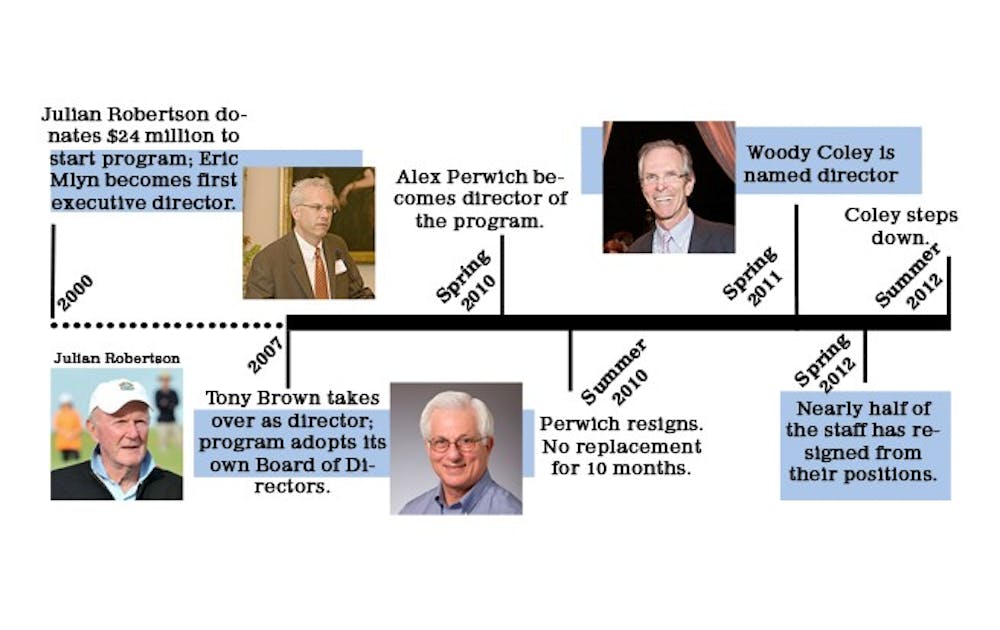The Robertson Scholars Program—designed to nurture leaders—currently has no permanent executive director and a dwindling staff.
Woody Coley, the Robertson program’s fourth executive director in its 12-year history stepped down from his position earlier this month after only a year. His decision—which resulted from tensions among the program’s leaders and shifting organizational structure—followed the recent resignation of several other staff members, leaving the program without direction.
Allen Chan, who has served as an internal consultant for the program, will act as the interim executive director when Coley finishes his term this month, said Fraser Seitel, spokesperson for Julian Robertson, the program’s benefactor and founder. Seitel, president of Emerald Partners communications firm, said Robertson was not available for comment.
In a May 31 email to scholars, Coley, former managing partner at the real estate consulting firm Value² Partners, LLC., said he chose to leave because his views on program governance differed from Robertson’s.
Seitel deferred to Coley regarding specifics about the discord between Coley and Robertson.
“It’s fair to say they didn’t agree on everything,” Seitel said.
Robertson, founder and managing partner of Tiger Management Corporation, gave the program an initial donation of $24 million in 2000, and his foundation has provided approximately $33 million since. He leads the Board of Directors for the joint merit scholarship at Duke and the University of North Carolina at Chapel Hill.
Over the course of the past academic year, three other members of the seven-person staff have also stepped down—former Associate Director for Operations Jeanne Kirschner, now the administrative director for the Institute for Genome Sciences and Policy; Abbey Greenberg-Onn, former assistant director for recruiting and selection; and Charisma Nelson, former staff assistant for selection and recruiting.
Kirschner could not be reached for comment, despite multiple attempts. Greenberg-Onn and Nelson also could not be reached. One of the program’s remaining staffers, Jay Green, program coordinator for scholar services, deferred all comment to Coley.
“I have nothing to comment on,” Coley said before hanging up the phone, preventing any questions from being asked.
Additionally, Coley’s predecessor, Alex Perwich, resigned in June 2010 after serving about four months in the position, citing personal reasons. Kirschner searched for Perwich’s replacement for nearly a year until Coley took the role April 2011.
Melissa Malouf, director of the Office of Undergraduate Scholars and Fellows, called the leadership turnover “complicated and baffling.” Since 2000, Malouf—also an associate professor of the practice of English—has been a member of the Universities Coordinating Committee, a group comprised of administrators from Duke and UNC to advise the program. The UCC has had significantly less influence over the scholarship in the past few years, she wrote in an email Tuesday.
DukeEngage Director Eric Mlyn was the scholarship’s first executive director, serving from October 2000 to July 2007. The program was then led by Tony Brown, professor of the practice at the Sanford School of Public Policy and current director of the Hart Leadership Program, through Spring 2010.
Although Brown is no longer closely affiliated with the program, he said staff turnover is typical, but recent turmoil may be attributed to Coley’s leadership.
“It’s possible that Mr. Coley was taking the program in a direction people weren’t comfortable with,” he said.
Brown noted that the program’s governmental organization changed while he was the director. Previously, the program was conducted as a structure within Duke and UNC. But the scholarship then adopted a five-person Board of Directors, operating separately from the universities.
This structure is distinct from Duke’s other merit scholarship programs, which function under OUSF. Brown added that Robertson is eager to be involved, which is not necessarily the case with founders of other scholarship programs.
“He is obviously a strong influence because he is a benefactor,” Brown said.
Malouf noted that the program’s directors are chosen by and work directly for Robertson himself. With leadership strained, students are taking the program into their own hands. In April, several scholars held a forum to discuss what it means to be a Robertson.
Multiple scholars declined to comment on the record, citing concerns about weakening their sense of unity.
Additionally, despite lacking a staff dedicated solely to recruitment, this year the program saw a record yield for the Class of 2016—with 25 students accepting the scholarship out of 34 offers.
“[Robertson] was very happy with the recruiting year,” Seitel said. “He appreciated [Coley’s] contribution.”
Get The Chronicle straight to your inbox
Signup for our weekly newsletter. Cancel at any time.

